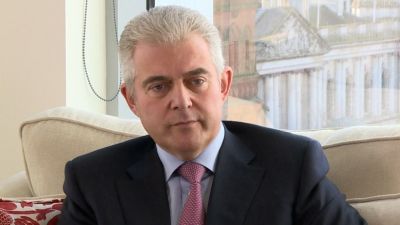Exclusive
'Real risk' Stormont won't return after election, Northern Ireland Secretary Brandon Lewis warns

Northern Ireland Secretary of State Brandon Lewis has told UTV he believes there is “a very real risk” the Stormont Executive will not return to business as usual post-election, given the DUP position on the NI Protocol.
Speaking to Political Editor Tracey Magee for Monday night’s View From Stormont, Mr Lewis noted: “I think there is a very real risk that the DUP will take the same view post 5 May that they have done now.”
He added: “Obviously we will be looking to get progress on the protocol between now and – actually over the next few days, let alone the next few weeks - so we can actually end up in a position where everyone can be more comfortable that there can be a positive outcome to the protocol.
“But regardless of where we are with the protocol, I will be continuing to make the point to all the parties that they should be playing their full part in the Stormont Executive to deliver for the people of Northern Ireland.”
The DUP’s Paul Givan resigned as First Minister earlier this month, as part of an escalating protest against the protocol, which has created trade barriers between Northern Ireland and the rest of the UK since Brexit.
The move automatically removed Sinn Féin’s Michelle O’Neill from her position as deputy First Minister.
Legislation has been passed at Westminster to prevent the total collapse of Northern Ireland’s political institutions.
The Northern Ireland (Ministers, Elections and Petitions of Concern) Bill will allow the Northern Ireland Assembly to continue without a functioning Executive for at least six months.
However, while ministers can stay in place, they cannot make the sort of decisions that typically require the whole Executive to sign off on.
Health Minister Robin Swann, for example, had to seek legal advice before lifting more coronavirus restrictions for Northern Ireland.
The UK and EU have reiterated their determination to find "durable solutions" to the NI Protocol after a meeting on Monday ended without a breakthrough.
Foreign Secretary Liz Truss and European Commission vice president Maros Sefcovic issued a joint statement after taking stock of progress in negotiations to reduce red tape associated with the disputed Irish Sea trade rules.
Talks between the two sides will now continue, but it is anticipated engagement will be more low key in the coming weeks and months, with London and Brussels keen to avoid raising tensions amid the forthcoming Assembly election campaign.
Ms Truss has said unilaterally suspending elements of the protocol – by triggering Article 16 mechanism - remained an option for the UK Government, but she added that her focus was on finding a negotiated solution with the EU.
“Article 16 is in the protocol as a safeguard if things aren’t working as they should,” she said.
“But what I want to do is achieve through constructive negotiations the solutions in place to benefit both communities in Northern Ireland.”
Mr Sefcovic said intensified negotiations over recent months to find an agreed settlement, discussions that involved more than 100 meetings, had so far resulted in “neither a breakthrough nor a breakdown”.
Sinn Féin’s Declan Kearney attended Monday’s meeting of the Joint Committee on the NI Protocol and, speaking afterwards, said: “It’s clear from the meeting that the solution proposed by the EU on medicines proves all problems can be resolved.
“The increase in north/south trade points to even greater economic benefits from the protocol for local businesses.
“It’s now time the British government abandoned its partisan approach to the protocol and acted in the interests of the majority of people and businesses who want certainty and stability, rather than in the interests of one political party.”
He added: “The focus needs to remain on finding solutions to ensure our local businesses can continue using the benefits of the protocol to create jobs and attract more investment.
“There is no credible alternative to the protocol. More progress can and will be made with common sense, pragmatism and political good faith.”
Catch up with View From Stormont here